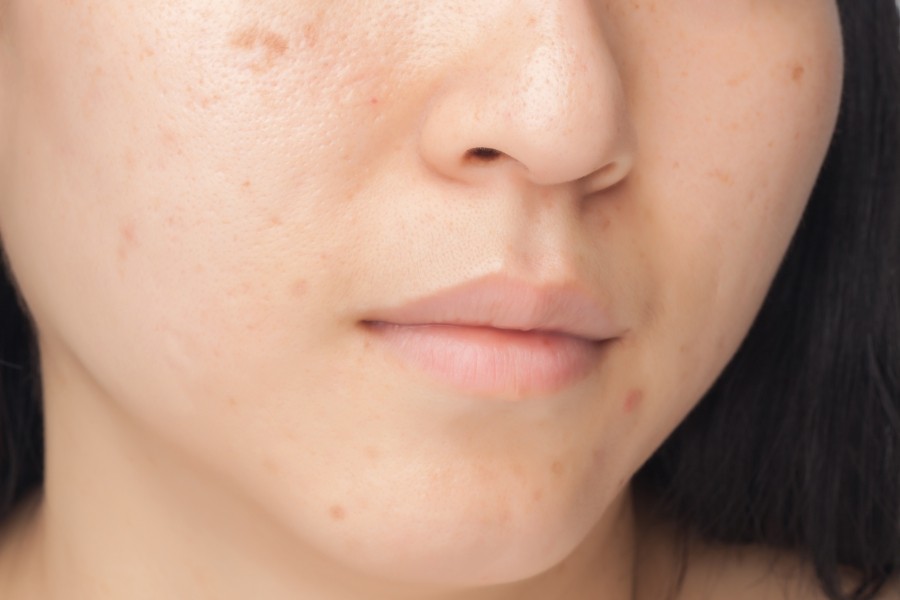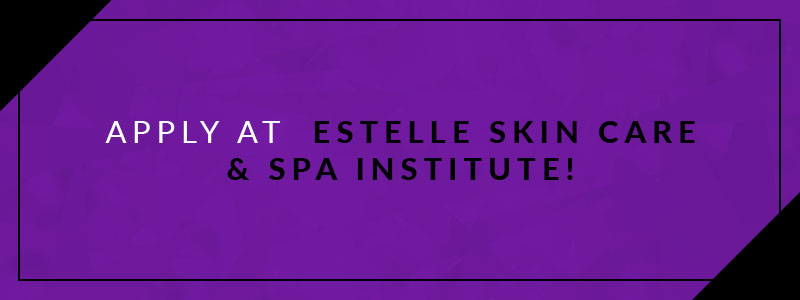
As an esthetician, you will likely encounter a number of different skin conditions throughout your training and career in the skin care industry. While estheticians are not doctors or dermatologists, we are well-equipped to identify and help treat certain skin conditions, as well as refer clients to a medical professional, should the need arise.
At Estelle Skin Care & Spa Institute, we believe that every client deserves to look and feel beautiful, which is why we provide the extensive training you need to deliver excellent results. In this blog post, we discuss eight common skin conditions, and the skin care treatments that may help alleviate them.
For the best esthetics education that Chicagoland has to offer, enroll in Estelle Skin Care & Spa Institute in Skokie. We are accredited by the National Accrediting Commission of Career Arts & Sciences (NACCAS), meaning that your degree will be recognized anywhere in the United States. In addition to training for new estheticians, we also offer continuing education classes for those already established in the skin care industry. To get started on your exciting new career in esthetics, schedule a tour of our campus today!
Acne Vulgaris
Acne vulgaris is perhaps the most common skin condition that you will encounter as an esthetician. Acne occurs when a person’s hair follicles become clogged with oil and dead skin cells. It most commonly affects adolescents, but can occur in people of any age. Common causes of acne include hormones, genetics, stress, infections, and insufficient hygiene. Acne can cause incredible distress, and even depression, for those who are affected.
Spa treatment for acne vulgaris should begin with a comprehensive skin analysis to identify sensitivities and aggravating factors. Facials, especially those specifically formulated to treat acne, can provide sufferers with thorough, yet gentle, cleansing that works to open pores and clear existing comedones (blackheads or whiteheads). Chemical peels and microdermabrasion can also help remove impacted material and provide even deeper cleansing.
Aging Skin
Not so much a “condition” as an inevitability for all of us, aging can have major impacts on the skin that are often visible to the naked eye. As people age, their skin loses elasticity and moisture, which results in wrinkles, as well as an increased risk of skin tags, warts, and dark spots. Sun exposure is a major determinant of how a person’s skin will age. Those who regularly apply sunscreen will likely experience less visible signs of skin aging than those who do not.
In terms of spa treatments, microdermabrasion and facial massage can both improve hydration in aging skin, reducing the appearance of wrinkles. Regular facials can also help skin remain refreshed and youthful-looking, by balancing the skin’s acid mantle.
Chloasma
Also known as melasma or hyperpigmentation, chloasma is an acquired, chronic skin condition in which brown patches appear on the face, arms, or back. This can lead to considerable embarrassment and distress. Chloasma is more common in women than men, as well as those who have naturally darker skin. The hyperpigmentation is caused by overproduction of melanin, which gets deposited in the dermis. Known triggers include sun exposure, pregnancy, oral contraceptive pills, and hypothyroidism.
Spa treatments for chloasma will look different from person to person, depending on the degree of darkening, skin sensitivity, and other factors. Some treatments that may help include chemical peels, microdermabrasion, laser treatments, and/or corrective makeup. Some clients also report improvement from the use of over-the-counter skin-brightening serums.
Eczema
Eczema is a very common skin condition resulting in red, itchy, dry, and crusted skin. Skin may also be cracked, swollen, oozing, or bleeding. Scratching and rubbing of affected areas should be avoided, as this can further exacerbate the condition. Eczema affects about 32% of people in the United States, making it one of the most common skin conditions. Eczema is usually caused by common skin irritants, such as soaps, detergents, disinfectants, or allergies. While eczema is a manageable, noncontagious condition, it still can cause considerable distress and embarrassment for those affected.
Those suffering from eczema can still enjoy a day at the spa. As a general rule, body scrubs and chemical peels can exacerbate symptoms, so it’s best to stick to facials, especially those formulated for sensitive skin. Facials can soothe inflamed skin and remove buildup, leaving clients feeling clean and beautiful.
Hypertrichosis
Hypertrichosis is excessive hair growth on a person’s face and/or body. It is often a congenital condition, meaning that it is present at birth, although it may also be acquired from certain cancer treatments or even eating disorders. Addressing the underlying cause can usually reduce the severity of symptoms.
In order to effectively treat the condition, it must first be identified by a licensed endocrinologist. Hair removal, through chemical epilation, electrolysis, and/or waxing is often effective.These treatments need to be repeated regularly, as hair continues to grow back. Estheticians should watch out for signs of scarring, dermatitis, or allergic reactions caused by hair removal, and replace the offending practice with something less irritating.
Psoriasis
Psoriasis is a skin disease characterized by dry, scaly skin, especially on the elbows, knees, and scalp. Psoriasis is often confused with eczema, but the two conditions have some important distinctions. While eczema can cause intense itchiness, psoriasis often results in a stinging or burning sensation. Skin affected by psoriasis is also thicker and more inflamed than eczema. Clients should consult a qualified dermatologist in order to correctly identify which skin condition they are suffering from.
Because psoriasis is a chronic condition, treatment is aimed at managing symptoms and improving quality of life. Laser treatments and UV therapy may decrease symptoms, as well as treatments involving minerals and mud. Massages with essential oils may also soothe irritated skin.
Rosacea
Sometimes called adult acne, rosacea is a chronic inflammation of the face from an unknown cause. Rosacea causes redness and visible blood vessels in the face that may flare up for weeks to months and then go away for a time. While rosacea can affect anyone, it’s most common in middle-aged women with light skin. Triggers include sunlight, hot drinks, spicy foods, alcohol, exercise, hot baths, and stress. Prolonged use of cortisone creams can also worsen symptoms.
Rosacea is uncurable, so spa treatments are aimed at managing symptoms. Facial massages, chemical peels, and heat/steam services should be avoided, as these can trigger flare-ups. Some spas offer specialized rosacea facials aimed at strengthening capillaries and balancing skin tone. Intense Pulsed Light (IPL), laser therapy, and electrocautery may also be used.
Skin Tag
Also called an acrochordon, a skin tag is a benign tumor that typically forms in areas where skin rubs together, such as the underarms, neck, inner thigh, breasts, stomach folds, and eyelids. Skin tags are seen in 46% of the US population. They are typically about the size of a grain of rice. Skin tags should never be cut off or teared at home, as this can cause infection. Clients seeking skin tag removal should instead consult their family doctor or dermatologist.
Some spas also offer skin tag removal through laser therapy, cortisone shots, or cryotherapy, which involves using liquid nitrogen to “freeze” off the growth. These treatments are often painless and instantaneous.
As an esthetics student, it is important to remember that you will encounter all types of people, each with their own, unique skin, throughout your career. Being informed on all skin conditions, and what treatments options are available, will help you provide your clients with the best service possible.
At Estelle Skin Care & Spa Institute, we are committed to preparing our students to be leaders in the skin care industry. If you live in the Chicago area and are interested in enrolling, schedule a campus tour now. We are also happy to discuss with you any questions you may have about our different programs and financial aid options. Call now to speak to one of our friendly representatives and embark on your career in the skin care industry today.





